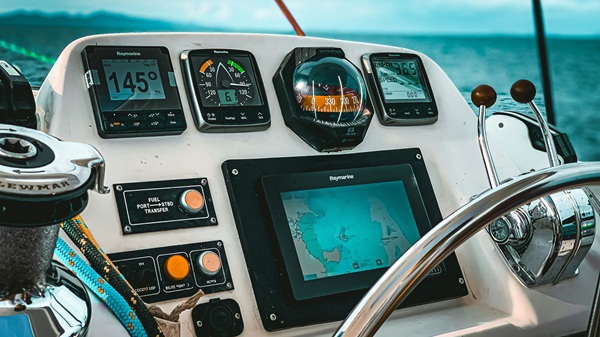*IMPORTANT NOTE: This article is contains a general overview of possible legal and tax benefits of owning your yacht through a Limited Liability Company and is not legal advice. You should always consult your attorney and accountant in your home country and locality, and in the country where your vessel will be flagged, to determine the specific details, laws, and tax rules before making any legal or tax decisions.
A frequent question we hear from yacht buyers is “should I form an LLC to own my boat?” It’s a complex question, and the answer depends on how you plan to use your boat, where you will keep it, and where you live.
The quick answer is that if you’re looking for liability protection, you might get some benefit from an LLC, but it may not be worth the hassle, and good insurance may be a better answer. But if you’re planning to charter your boat for part of the year or you own it with multiple partners, there can be important tax and/or legal benefits. We’re taking a deeper closer look so you know if you need to give your lawyer and accountant a call before you close on that new yacht.
What is an LLC (Limited Liability Company)?
A Limited Liability Company is, in the strictest sense, a U.S. based legal entity that is a private, limited company. It allows for pass-through taxation to the member’s U.S. tax returns at personal, not corporate rates, and offers limited liability for some financial protection and against certain acts and actions. As a legal entity, it behaves like a partnership, but with some protections and flexibility of a corporation.
The U.S. creates and administers LLCs at the state level, and each selected state of incorporation has varying rules, fees, protections, and requirements. And some states require additional paperwork for an LLC from another state to function inside their own. For example, a Delaware based LLC which registers a yacht in Florida must be authorized by the Division of Corporations to do business in Florida before a tax collector’s office will accept the registration.
There are similar entities offering similar benefits available in other countries such as the French Société à responsabilité limitée (SARL), the German Gesellschaft mit beschränkter Haftung (GmbH), and the Belgian and Dutch Besloten vennootschap (bv). Owners outside the U.S. should consult a local attorney about the domestic equivalents for entities offering benefits similar to an LLC. This article speaks to benefits which may exist in all these entities, but for simplicity will refer to U.S. laws and terminology.
Read also: Buy or Rent a Yacht: Find the Perfect Option for Your Lifestyle and Dreams
Why are yacht owners using an LLC?


The primary reasons to establish an LLC are for a yacht which will charter part of the time, or to handle an ownership group of individuals sharing a yacht. Others may seek specific tax benefits, or wish to have the additional protections an LLC may afford.
An LLC is useful for business
If you charter your yacht or use it with a business part time, then an LLC offers direct benefits for taxation and reducing expenses. As a “pass-through” entity, an LLC allows owners to report its profits and losses directly on their U.S. tax returns.
This allows a portion of yacht ownership expenses to lower taxes, as well as taxation of charter income at a possibly lower rate than corporate taxes. At the end of the tax year, the owner deducts expenses from charter revenues, and then applies the resulting gain or loss to their personal tax return.
Note that the Internal Revenue Service “Hobby Loss Rule” applies – your charter business must turn a profit three out of five years or you will lose the benefits. It’s not acceptable to charter a couple of weeks each year then deduct 100% of your operating expenses to create a massive loss. The IRS will disallow this, and your accountant should warn you and help apportion expenses against revenues and personal use.
Multiple ownership sharing is easier
Although a partnership agreement can work with shared ownership, an LLC is an excellent alternative as the numbers of owners rises. You can incorporate operating rules for expense sharing, yacht use, and decision makers into the LLC’s agreement paperwork, and these rules will transfer between share owners.
Using an LLC up front allows for selling of ownership shares, as well as providing a pre-defined exit strategy for ending the ownership agreement should all owners decide to end ownership. Having everything put together in a pre-planned package saves many headaches over the lifetime of the ownership group.
The limited liability of a LLC can protect yacht owners
The primary risks of yacht ownership are financial and physical liability. Your yacht can cause harm to people and property, and owning it directly can subject you and your assets to lawsuits and collections. Owning the yacht through an LLC typically limits liability to the LLC’s assets, offering owners some protection.
However, if your individual actions cause harm on a yacht, an LLC may not protect you from personal liability and lawsuit. If the owner is in command and causes an accident with negligence or irresponsibility, the owner may still be subject to lawsuits or prosecution. Jurisdictions vary in the level of protection offered, and operators should always take steps to protect themselves.
Banks and other institutions are familiar with LLC ownership, and often require personal guarantees of loans, mortgages, and other financial instruments used with the yacht. So financial protection isn’t absolute.
LLC can add an extra layer of asset protection
Because the LLC owns the asset, it is much more difficult to sue LLC members if the yacht incurs liability. Therefore, it is more difficult to attach personal property and assets, as the individual is not directly involved in any incident which creates the liability. Whether it’s a lawsuit from an injury or disputed expenses for the yacht, it’s harder to reach your personal assets when the LLC is involved.
Having your own under a LLC comes with tax advantages
While we discussed the tax advantages for chartering and business use, there’s one other tax advantage of LLC ownership, which may actually increase the resale price of our yacht. This depends on the structure of the LLC and the states involved.
Most states collect a sales tax when a yacht changes hands, and this can be a significant amount of money. The state collects the tax when the yacht is re-titled to the new owner. However, some states do not collect sales tax when LLC shares are sold. Selling the LLC that owns a yacht avoids re-titling or re-registering it, because the yacht’s ownership remains unchanged. This can eliminate the taxable event of the yacht changing ownership, and some of that value can make the yacht more attractive to buyers.
Consult an attorney and an accountant for more details. Consider how long you intend to keep the yacht, and if the complexities of LLC ownership offset the tax savings. Improper handling may leave you owing taxes in multiple jurisdictions.
Why wouldn’t you want an LLC for your yacht?


LLCs add complexity and expense to yacht ownership; that’s why most owners of yachts for purely personal use don’t bother. The simplest way to own a yacht is to just buy it personally, and there are options if you’re concerned about liability.
Some of the added complexity and expense include:
- Initial setup expenses with attorneys and accounts to create the LLC, establish the operating agreements, and other paperwork.
- Annual reporting requirements for the LLC to state and federal authorities consume time and money.
- Annual filing fees in local jurisdictions – you may incur business fees and taxes in the LLC creation state and the yacht registration state.
- Complications at sale time if a yacht must be sold out of an LLC.
- Smaller boats face may face complicated customs procedures in foreign countries because their ownership documents lack a link to the captain/owner’s passport.
Small yacht owner/operators with pleasure craft for private use rarely need the protections of an LLC and won’t qualify for enough tax savings to justify the cost. If liability and asset protection are a concern, supplemental insurance can give additional coverage as needed.
Read also: Chartering Requirements and Regulations: A Guide for Boat Owners
Where should you set up an LLC for a yacht?


Part of any discussion about LLC ownership will include where the yacht will berth and where the owner lives. Picking the convenient states with flexible laws can seem easier, but if you’re keeping the boat in your home state, you might find the process simplified by having it all in one jurisdiction. This removes dealing with other state governments and bureaucracies and streamlines every transaction.
Conversely, some states make LLC ownership simpler and cheaper, and there’s a reason so many yacht LLCs register in Delaware. Your attorney will ask you many questions about your plans, so research all the implications of choosing one state versus another as the titling and registration authority for your yacht.
Is it right for you?

The least helpful yet most obvious answer is “maybe.” Ownership structures are a complex question you need to address with your attorney and accountant to be sure to make the right choice. But if any of the following conditions are true, set up that conversation before the purchase process gets too far.
Consider an LLC if:
- You plan to charter the boat for a significant percentage of the year.
- The boat will have multiple owners.
- You have substantial assets to protect, and the complexities are more than an insurance policy can cover.
- The tax savings for your ownership plans exceed the complication cost of LLC ownership.




